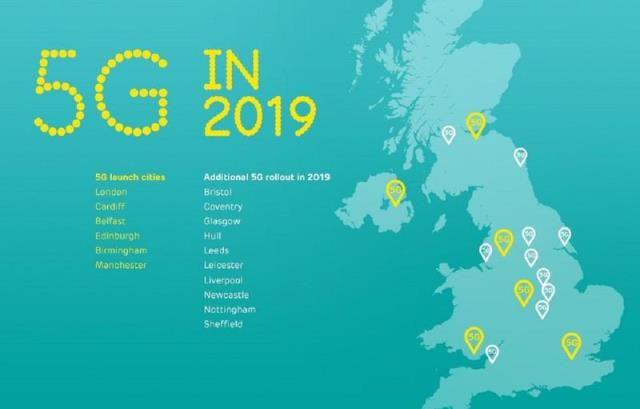EE, Britain’s biggest mobile operator, said on Wednesday it would be the first company to launch 5G services in the country – beating Vodafone.

EE’s 5G services will be available in six UK cities, including London, Cardiff, Belfast, Edinburgh, Birmingham and Manchester from May 30.
Additional cities, which will receive 5G coverage this year, will include Glasgow, Newcastle, Liverpool, Leeds, Hull, Sheffield, Nottingham, Leicester, Coventry and Bristol.
EE, which is owned by BT, said it will have 1,500 5G sites by the end of 2019 and that 5G smartphones would be ready to order from Wednesday morning.
EE said on Wednesday its 5G network would rely on equipment made by China’s Huawei, at least for the first few years, as it announced plans to switch on the next-generation services on May 30.
However, BT-owned EE joined rival Vodafone in pulling a Huawei smartphone from its 5G launch line-up because of uncertainty about support by Google’s Android after a U.S. move to block the Chinese firm’s access to its technology.
5G smartphones
Its 5G smartphone range will include Samsung Galaxy Fold, the Samsung Galaxy S10 5G, the Oppo Reno 5G and the LG V50 ThinQ.
5G pricing
The price of 10GB smartphone plans will be £54 a month. This goes right up to 120GB plans that’ll cost you £74 a month.
5G smartphone customers will have access to the BT Sport app with HD and HDR video, as well as various data passes for Music, Gaming or Video.
If 5G customers take the top 120GB plan, they will get three Swappables, which EE claims are worth £33.99 a month.
EE said its 5G customers can also upgrade their smartphone with the EE Upgrade Anytime perk.
EE said it will be focusing on outdoor coverage first, followed by indoor coverage later.
EE confirmed that the telecom operator wouldn’t be throttling 4G speeds for existing customers to make 5G more tempting.
5G roll out
EE is upgrading more than 100 new sites to 5G every month. The new 5G network will use band n78, which was auctioned earlier this year in the UK, and EE’s 5G network will be built on top of its 4G network. This means that EE customers’ 5G experience will benefit from the quality of both 5G and 4G, as well as the underlying fixed network.
EE’s 5G rollout will take place in three different phases.
The first phase will run from 2019 to 2022, and will include the initial 5G rollout and improvements to 4G.
According to EE, a total of 1,500 sites across the UK will support 5G networks by the end of 2019.
The second phase – which begins in 2022 – will see a “full next-gen 5G core network” introduced.
This will be complemented by new 5G spectrum, and smartphone chips with new features designed to take advantage of faster 5G tech.
And the third phase, starting in 2023, promises “multi-gigabit speeds” and “ultra-reliable” low-latency mobile internet.
EE is not selling Huawei’s 5G smartphones, likely due to the ongoing US blacklist that prevents Huawei phones from receiving major Android updates.
EE CEO Marc Allera said: “We’ve put the Huawei devices on pause until we’ve got a bit more info on that.”
Earlier this month, Vodafone revealed it would be switching on its 5G network in seven UK cities on July 3, 2019. Vodafone’s seven 5G launch cities include Birmingham, Bristol, Cardiff, Glasgow, Manchester, Liverpool and London.
Qualcomm Technologies announced 5G smartphones will be powered by Snapdragon 855 Mobile Platform with Snapdragon X50 5G Modem and Qualcomm Technologies’ RF Front-End (RFFE) solutions.
TIM 5G with Huawei
Brazilian wireless carrier TIM said on Wednesday it is using equipment provided by China’s Huawei Technologies to conduct 5G tests in Florianopolis, a city in the south.
Pietro Labriola, chief executive officer of TIM Participacoes, said: “Florianopolis is the first city in Brazil to have a 5G antenna in the 3.5 GHz frequency.”
The local subsidiary of Telecom Italia also has 5G testing initiatives in two other cities in Brazil, where it is partnering with Nokia and Ericsson.
